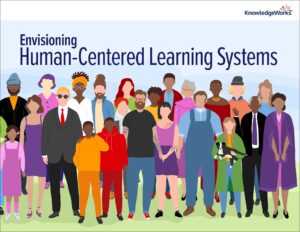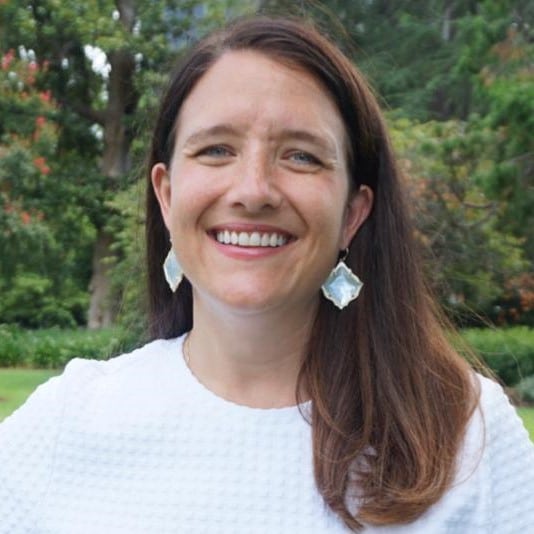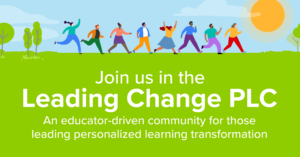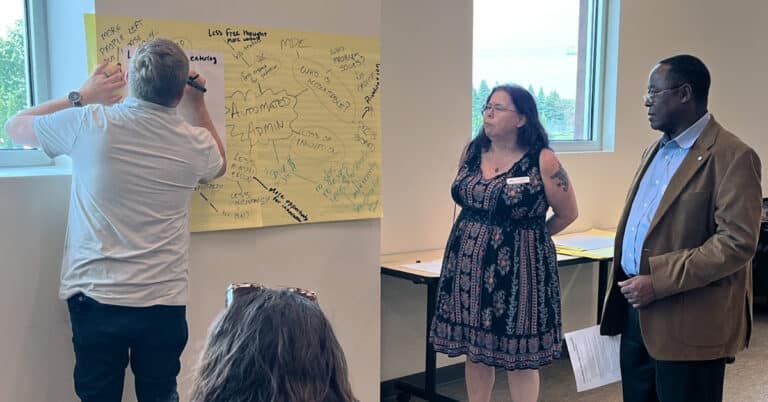Learner agency doesn’t mean that you simply drop students into a class and let them figure everything out on their own. Authentic, impactful, goal-oriented learning experiences require ongoing collaboration and guidance from educators.
To further explore “co-create authentic learning for agency and impact” as a strategy outlined in Envisioning Human-Centered Learning Systems, KnowledgeWorks Director of Strategic Foresight Katie King asked KnowledgeWorks Senior Director of Teaching and Learning about the concept of learner agency and how it intersects with possibilities for human-centered learning.
When KnowledgeWorks is partnering with learning communities to implement personalized, competency-based learning, how do you define learner agency?
We’ve defined learner agency as the initiative and capacity to act in a way that produces meaningful change in oneself or the environment. When we work with learning communities, it really means how we are empowering students to take control and ownership of their learning and to feel like school is something that isn’t being done to them, but that they have a stake in it and are active participants.
At that same time, it’s important to remember that students need guidance, especially in the beginning, on how to exercise their agency. Humans need guidance and support as they are developing, and learners need that as they are finding their voices and their paths. This is particularly important to remember for older students who may be exercising agency in other areas of their lives but have not been given this opportunity at school. Part of helping students develop agency is to connect what we do every day to the broader picture of why that will be important to them.

Education’s role in supporting the healthy development of young people, effective lifelong learning and community vitality is increasingly crucial. How can we help create human-centered learning systems?
Learn more >
In our publication Envisioning Human-Centered Learning Systems, we suggest that educators “Co-create authentic learning for agency and impact” as a strategy for realizing a vision of human-centered learning. Can you speak to what makes an authentic learning experience and how it connects to learner agency?
When we talk about authentic learning experiences, I think people jump to project-based learning, which certainly can be authentic. But they aren’t interchangeable. I believe that learning is authentic if students can connect the dots and understand what they are learning, what skills they are using to engage in that learning, why what they are learning is important and how they will know when they’ve mastered it. Projects can support that understanding, but they aren’t the only way, and not every project leads to that understanding.
I want to walk into a class and ask a student of any age, “Tell me about what you’re doing,” and hear them actively speak to whatever task is in front of them and why it’s important. When you ask that question in a traditional classroom, you’ll often hear, “Oh, I’m doing math or I’m doing this worksheet.”
When students understand the mechanics of their own learning and have developed an ongoing awareness of what they are doing and why, they are better equipped to ask for what they need, to pursue what interests them and to ask big questions that can then lead them to make change in the world around them. All those actions are elements and indicators of agency.
Where would you recommend an educator start if they want to support students in developing more agency? What should come first?
One of our mantras is to think big, start small and act fast. You need to have this big vision of where you want to go, but you can’t tackle it all at once. One simple step is to make the learning goals transparent. You can walk into any classroom in the country and you’re going to see the targets or the objective for the day up on the board, but we need to go further than that. What is it that we need to learn in math this year and why does that matter? Don’t keep that a secret; talk about it all the time and connect the dots.
The more educators use student-centered approaches to reinforce student agency, the more motivation and engagement are likely to rise. Learn more with “Motivation, Engagement, and Student Voice” by Eric Toshalis and Michael J. Nakkula.
Read the brief >
Download the toolkit >
We talk a lot about goal setting. It’s is a critical strategy for agency and for humans of any age and helps us all understand the ownership that we each have over what we want to achieve, whether it’s an academic goal or a behavioral goal or something we want to achieve in sports or anything. If we hope to have human-centered learning systems, we need to provide young people and adults the skills and tools to articulate what they want for themselves.
We also want to help students start to track their own learning. If you’ve unpacked for them what they need to learn, then they will be tracking where they are, beyond just a grade on a report card. They will know what they have learned and what they still need to learn.
So, all those pieces start to fit together: learning is transparent for students, they are setting goals around what they want to accomplish, and they are tracking how they’re doing on those goals. These are all things that any teacher can do in their classrooms right now, regardless of what else is happening in the school around them.
Then you can start to tackle some of the bigger pieces. You can leverage that confidence and awareness among students and start thinking about projects and providing more flexible learning environments and reflecting on the grading system and examining those larger systems-level pieces. Having a truly human-centered learning system will require that we reimagine the overarching structures where teaching and learning happen.
Learn how a mindset shift is helping students build problem-solving and risk-taking skills – even in the middle of a pandemic.






